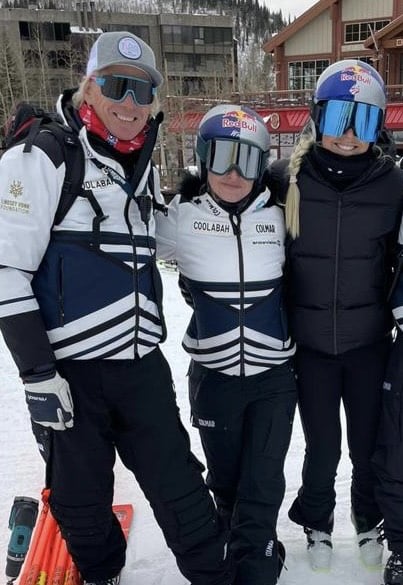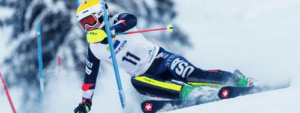Former U.S. coach launches next phase of independent women’s racing

[ad_1]
Shauna Farnell
by Shauna Farnell
Chris Knight is no stranger to seeing athletes reach their ultimate potential. He’s now launching his next chapter by running an independent team, hoping to continue the streak.
The Kiwi who grew up skiing at Coronet Peak is a former alpine racer. He competed in the NorAms and was about to do his first season in Europe when he broke his leg in a rugby accident. He changed course and went to university, pursuing a coaching career.
Since then, he has notched an impressive track record guiding some of the greatest skiers ever.
Coaching benchmarks
It began with Australian Zali Steggall. Knight started as her ski technician and assistant coach, helping her become World Slalom Champion in Vail in 1999. Then, Knight became a one-person coaching/service unit for British racer Chemmy Alcott for a few years before joining the U.S. Ski Team in 2003. Starting with the U.S. women’s tech team, Knight privately coached Julia Mancuso from 2006 to 2012. These were Mancuso’s most successful years. They included her earth-shattering giant slalom gold medal at the 2006 Olympics, combined and downhill silver medals in the 2010 Games and all seven World Cup victories.
Knight’s focus then turned to Lindsey Vonn from 2015 to 2018, during which the American star landed two of her World Cup downhill titles, a super-G title, 22 Cup victories, two World Championship medals and her final (in 2018) Olympic medal. He also played a role in launching Mikaela Shiffrin’s career when she arrived on the World Cup scene.
“It was amazing,” Knight says, reflecting on his time with this U.S. Team. “Those were incredible years with Jules and Lindsey. Then Mikaela turned up at the end of it all. The talent was ridiculous.”
When Knight was in South Korea with Vonn at the 2018 Olympics, his wife went into labor. Thanks to an unexpected change in the race schedule, he made it home to Italy the day his son Brando was born.
“With that, my plan was very much to start something new. It was purely based on having a family and not wanting to be on the road so much,” Knight says. “With the Americans, you have to spend a lot of time in meetings, on the road, training in Colorado. It was a battle.”
The independent route
Around this time, Jeff Fergus, who also had a highly successful stint with the U.S. Team, including as Vonn’s head coach through the most record-breaking years of her career (2010-12), reached out to Knight to collaborate on an independent international women’s team.
“The idea was to bring higher level FIS athletes into college or the Europa Cup. It was also for girls wanting to race at a higher level on the World Cup, but not with their national teams,” Knight said.
Thus, Fergus and Knight launched the International Ski Racing Academy (ISRA). Based near Knight’s home in the Italian Dolomites, the academy launched its first year with six or seven athletes. By the second year, word spread and Knight and Fergus hired three female coaches to lead a team of 18 racers.
“It almost grew too quickly,” he adds. “The travel became crazy again when the plan was not to do that.”
Among the athletes to join ISRA was New Zealand phenom Alice Robinson. While most ISRA racers competed in speed, Robinson’s tech talent warranted instant focus and additional time commitment with added World Cup travel. For Knight, however, the young Kiwi’s skyrocketing success marks one of the most gratifying achievements of his coaching career.
The rise of Robinson
“I’ve known Alice and her family for a long time,” Knight says. “When I was with the Americans, in my downtime, I was in New Zealand doing some youth camps with a friend of mine who has a foundation working with the country’s rising stars. Alice was one of them. That friendship developed from there.”
On an upward trajectory, Robinson came onboard with ISRA and hit orbit, becoming the first New Zealander in history to win World Juniors in 2019 and earning a start at the World Cup Finals giant slalom. At age 17, she landed on the podium, finishing second, a mere 0.30 seconds behind Shiffrin. She fired into the next season (2020), winning the opening race in Sölden, Austria.
“That was exciting, very exciting. I certainly didn’t expect her to be in third place after her first run at the World Cup Finals. I was at the top of the course and could hear the crowd getting louder and louder. She ends up second. Then, she comes into Sölden and beats Mikaela,” Knight says.
Exciting as it was, Robinson’s success for Knight “meant more time away from home.”
ISRA disbanded this spring, and Knight and Fergus amicably parted ways. In five years, in addition to helping boost Robinson, the academy also served as a significant springboard or building block in the careers of athletes like American Tricia Mangan, Slovenian Maruša Ferk, German Fabiana Dorigo, and Elvedina Muzaferija from Bosnia/Herzegovina.

Independent rewards
“The most rewarding part of it is how quickly you saw your idea blossom,” Knight says. “Over the years, you sit in meetings with the U.S. Team. You hear the Canadians. You see so many fringe athletes and look at what might have been possible if you tried this or that. But this wasn’t just an idea; it was actually putting something into place where you thought there was a need and see the results come from it.”
The range of results for ISRA athletes was vast and gratifying. Knight helped hoist Ferk to the best results of her career after she was kicked off the Slovenian team, guided Dorigo to find her stride with Team Germany and assisted in Muzaferija’s becoming Bosnia’s most decorated skier, her nation’s first to score points on the World Cup.
“Elvedina from Bosnia – when I first talked to her two years ago, I said, ‘We need to make a few equipment and technique adjustments, then you will qualify for the World Cup quickly.’ It was the same with Maruša. They had kicked her off the team. She started with us. Seeing her get top 10s in the Olympics and top 15 in World Cup downhill and super-G – that was rewarding as well,” Knight says. “The goal was never to keep the athlete but to give them the opportunity to return to their national team or lower points to go to college. The goal is to get them to achieve what you know they can. If you manage to do that, well done.”
Enter, LIT Racing
Now that ISRA is gone, Knight is rebranding, carrying the same vision and goals into the Ladies International Team (LIT). Focusing more on the tech side, Knight and a team of coaches (including Ferk, who retired from racing two seasons ago) will remain based in the Dolomites. They aim to deliver female racers from all over the world to a new level, focusing on junior and Europa and World Cup-level athletes.
“I think the most important thing is to deliver on your promise,” Knight says. “It’s always been my dream ever since I started coaching to have an academy, a base somewhere that you’d provide for a World Cup or Europa Cup athlete. I want to give that opportunity and experience to an athlete who would otherwise never get the chance.”
Not skipping a beat, Knight is launching LIT Racing spring camps in the French and Italian Alps. Thus far, the team consists of a pair of young Kiwis, American Galena Wardle, Gwyneth Ten Raa from Luxembourg, Slovenian Pika Dvornik, and interested athletes from Canada, Switzerland, Sweden, Ireland, Greece, Turkey and Japan.
“The international name really does attract an international team,” Knight says. “I am excited. It’s something I’ve always wanted to do. Hopefully, I’ll be able to keep doing it.”
[ad_2]
Source link





